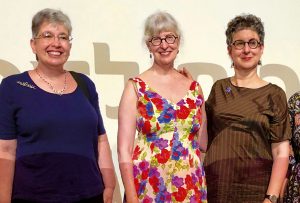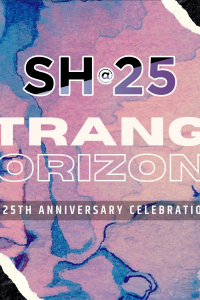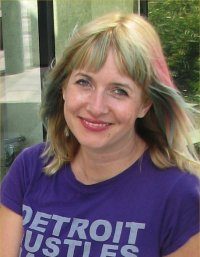ICon Report
![]() One of the perils of themed conventions, as most conventions in Israel are, is that the program might be one-dimensional. For a convention like ICon, which is aimed at large and diverse audiences, it can be particularly problematic. Avoiding this requires choosing the right theme combined with hard work of the programing team, and the ICon team did a great job this year. The theme, “Love,” meant that the possibilities were virtually limitless and it showed in the program. Among the some 450 events that took place over three days (25-27 September 2018) you could find lectures and panels about love potions in folklore, love stories in time-travel, love as redemption in Cordwainer Smith’s works, the possibility of creating an AI capable of love, love (or the lack of it) in Tolkien’s works, the villains we love to hate – and many, many more. This diversity of events allowed just about anyone to find something to his taste, and of course not all events dealt with this theme.
One of the perils of themed conventions, as most conventions in Israel are, is that the program might be one-dimensional. For a convention like ICon, which is aimed at large and diverse audiences, it can be particularly problematic. Avoiding this requires choosing the right theme combined with hard work of the programing team, and the ICon team did a great job this year. The theme, “Love,” meant that the possibilities were virtually limitless and it showed in the program. Among the some 450 events that took place over three days (25-27 September 2018) you could find lectures and panels about love potions in folklore, love stories in time-travel, love as redemption in Cordwainer Smith’s works, the possibility of creating an AI capable of love, love (or the lack of it) in Tolkien’s works, the villains we love to hate – and many, many more. This diversity of events allowed just about anyone to find something to his taste, and of course not all events dealt with this theme.
This year’s ICon also marked a decade to what might be the most ambitious media project ever – the Marvel Cinematic Universe. Entire conventions can revolve around the MCU (and I’m sure some have), and at ICon we got just a taste of the discussions that have evolved around this project – from the creation of a new fandom, to the complex relationships between the movies, the TV series and the larger Marvel universe, to the way characters developed over the past decade and where they might be headed.
This ICon also hosted the launch in Israel of Zion’s Fiction – a groundbreaking anthology of Israeli speculative fiction in English (edited by Sheldon Teitelbaum & Emanuel Lottem). I had the honor of being consulted during the selection process, and of editing some of the stories in it.
But the highlight of this convention were the guests – guest of honor Ann Leckie along with Ellen Kushner & Delia Sherman. They were insightful, articulate, and very kind and welcoming. Their joint panel on gender was absolutely fascinating, the panels about translating their books to Hebrew were illuminating and from what people who went to their writing workshops described them as instructive and eye-opening.

I asked about the fact that for me, having read the Radch series both in English and in Hebrew, the gendered nature of Hebrew gave the books a somewhat different emphasis.
“That gap is an unavoidable consequence of translation. Going from one language to another isn’t just a simple ‘substitute this term for that’ kind of thing, even closely related languages work in different ways. I assume that, given an excellent translator (a safe assumption for the Hebrew edition), the result might not be exactly what I wrote, but something new that I could never have written. I like that idea very much.”
We went on to talk about fan interpretations of her work – in art and in fiction.
“I heartily approve of fanfic and fan art! I won’t read fanfic – I feel like it’s not written for me, and the folks who write it don’t need to feel like I’m going to ever judge what they’re doing – but I collect fan art on a Pinterest board, when I come across it. Just personally I feel like fan works are one of the highest compliments I can receive. People don’t spend hours drawing, or writing, unless a story has really hooked them.”
Going along with the theme of translation and interpretation I asked if the role of the translators in the books was meant to give the reader an outside perspective of the Radch.
“Ah, not really, but that does make sense. To be honest, when I write my intentions are often very practical – what will move the plot ahead in the direction I want? What characters do I need to make a scene work? What’s likely to be around those characters? – and then, later, I’ll see that all of those very practical choices are doing more than just what I thought I was asking them to. The translators I brought on as a way of making the Presger presence (and threat) immediate. And then, of course, they were so fun to write. That alone would have been enough!”
I asked whether Breq’s singing and the hand gestures described in the books are a look at non-verbal communication.
“Ah, that’s interesting! I hadn’t thought about that. Of course, verbal communication is so much easier to do in writing, isn’t it. But it’s not the only way we communicate. Even when our gestures aren’t formally defined, with obvious meanings, we use gestures and movements when we talk, that underscore what we’re saying. To be honest, I was just trying to get across that those sorts of gestures existed, that the Radch has its own vocabulary of such gestures, both formally recognized (like our thumbs-up, or beckoning gestures, or waving goodbye) and not.”
And finally if along with other works, her books are a part of a reinventionor a resurgence of space opera.
“Oh, I hope so! I love all sorts of science fiction, but ever since I was a kid, space opera has been one of my favorites.”
ICon’s biggest problem these days, I think, is the venue. Most events are held in a high school and an adjoining arts-and-science education center, with some events held at the nearby Tel Aviv Cinematheque. It is a great location in many ways, but the main buildings were not built with the thought of accommodating that many people at once (about 10,000 tickets were sold to different events). This is especially problematic with regards to accessibility – simply because these are older buildings and when they were built much less thought was given to these issues. ICon has made great strides in that area over the past few years, but the conditions are limiting these efforts. Finding another suitable venue, which the organizing bodies can afford, has proven to be impossible so far.
One of the things that ICon continues to do well, and other conventions in Israel are following suit, is catering to children. All along the three days of the conventions there are workshops, readings, and roleplaying games for children, some of them for kids as young as four.
Next year’s theme is not yet known (at least to me,) but the guest of honor will be Brandon Sanderson.
–Ehud Maimon
This report and more like it in the November 2018 issue of Locus.
 While you are here, please take a moment to support Locus with a one-time or recurring donation. We rely on reader donations to keep the magazine and site going, and would like to keep the site paywall free, but WE NEED YOUR FINANCIAL SUPPORT to continue quality coverage of the science fiction and fantasy field.
While you are here, please take a moment to support Locus with a one-time or recurring donation. We rely on reader donations to keep the magazine and site going, and would like to keep the site paywall free, but WE NEED YOUR FINANCIAL SUPPORT to continue quality coverage of the science fiction and fantasy field.







